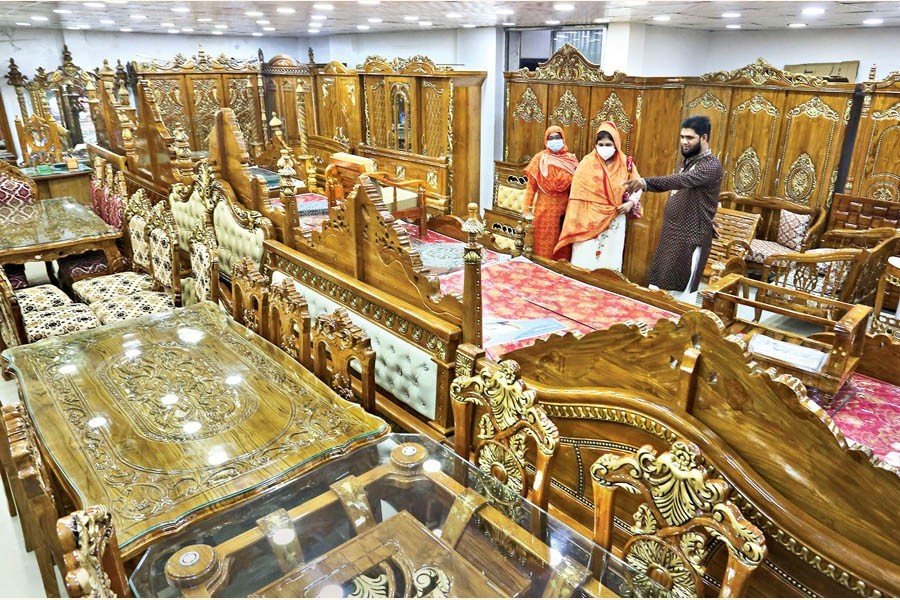Furniture industry, yet another victim of Covid
Nearly 0.6m workers have lost jobs , 04m more might be unemployed, says a2i research study

Published :
Updated :

The country's furniture makers, especially the small and 'unbranded' ones, have been badly affected by the ongoing Covid-19 pandemic.
The people involved in furniture business said overall sales of furniture or home decorative products have declined considerably since the outbreak of the Covid, leading to an inevitable cut in employment in the sector.
Many employees in this sector have lost their jobs while a good number of them is still at risk of losing theirs as the demand for furniture continues to a very low.
They said furniture or home decorative products are not essential ones. So, in this difficult time, in terms of saving lives and livelihoods, most people are least interested in buying these items.
Industry leaders said many micro and small entrepreneurs might be forced to leave the trade if required policy supports are not offered to the sector.
Unbranded furniture still dominates more than 65 per cent of the whole market demand, they said.
The findings of a recent research titled "Post- Covid-19 Jobs and Skills in Bangladesh" conducted by the a2i has revealed that approximately 0.6 million workers have been laid off in this sector and the number of such workers might go on rising.
"The prospect looks bleak (for the industry) as the demand for furniture will continue to be low" as the economy has slowed down, according to the a2i research stufy. The economic recovery might take nearly a year's time, it projected.
During this recovery period, disposable income of people will be low and they are unlikely to buy furniture.
The a2i research estimated that approximately 1.0 million workers might be unemployed in this sector by the end of this year.
The economic meltdown due to the coronavirus will have drastic impact on this sector that has been flourishing over the years with an estimated revenue, exceeding Tk 100 billion (Tk 10,000 crore) in 2019.
With the demand for furniture declining locally and globally in a post-pandemic work, many might be left unemployed in this sector, it also projected.
When asked, Selim H Rahman, chairman of Bangladesh Furniture Industries Owners Association (BFIOA), said there are two types of industry in the sector--organised and unorganised.
"And the majority of them are unorganised and small in size across the country and they are the ones that have lost most business during the pandemic. As a result, many employed in this units have also lost jobs," he added.
Echoing Mr Rahman, Jalal Ahmed, owner of Shahana Furniture, said small factories are the worst sufferer as they generally supply products to the medium-sized factories.
Their business has declined up to 70 per cent compared to last year, he claimed.
Moreover, small factories are not getting any support from the banks and government-announced relief package, he deplored.
Many small factories have closed down, he said, adding that he personally incurred a loss of Tk 3.9 million from a single showroom during last six months.
It is not possible for all to run business after such a huge loss, he noted.
August to December is the peak season for the furniture sector, Mr Ahmed said, adding that though factories and shops have opened gradually after the lockdown, business has started picking up negligibly.
"It might take quite a long time to make a comeback."
Mr Rahman, also chairman and managing director of Hatil Complex Ltd, said they were also facing difficulties in exporting furniture due to the pandemic.
Only three to four companies are currently exporting furniture, said Mr Rahman who annually exports furniture worth Tk 150-180 million.
The research, however said, in the near future, there will be an increasing demand for CNC (Computer Numerical Control) and robotics in the furniture sector which will create some additional jobs.
On the other hand, furniture exports are likely to dry up due to travel restrictions imposed to contain the spread of the virus, it added.
Furniture export fetched US$74.41 million in last fiscal year which was $46.26 million in FY 2015-16, according to the Export Promotion Bureau (EPB) data.
Making furniture is an art which takes years to master and there are many technical experts in this sector who do not have transferable skills to work in other sectors, the a2i research said, suggesting that the government needs to come up with re-skilling programmes for this particular group who will be unable to find jobs in other sectors.
It also recommended putting a limit on the import of furniture during post-lockdown in order to protect jobs and support small entrepreneurs in this sector.
Other recommendations included encouraging automation of production processes by the government in the furniture sector by reducing VAT on import of solutions like Computer Assisted Manufacturing (CAM) and Computer Numerical Control (CNC) machines.
Local furniture sector does not produce artificial wood, industry people said, demanding that the government should provide incentives to furniture makers so that they are encouraged to produce artificial wood locally.
Besides, the design of furniture plays a key role in influencing purchase decision, they said stressing on imparting training on specific skills like polishing, engraving, wood carving and overall furniture design to improve the quality.
munni_fe@yahoo.com


 For all latest news, follow The Financial Express Google News channel.
For all latest news, follow The Financial Express Google News channel.